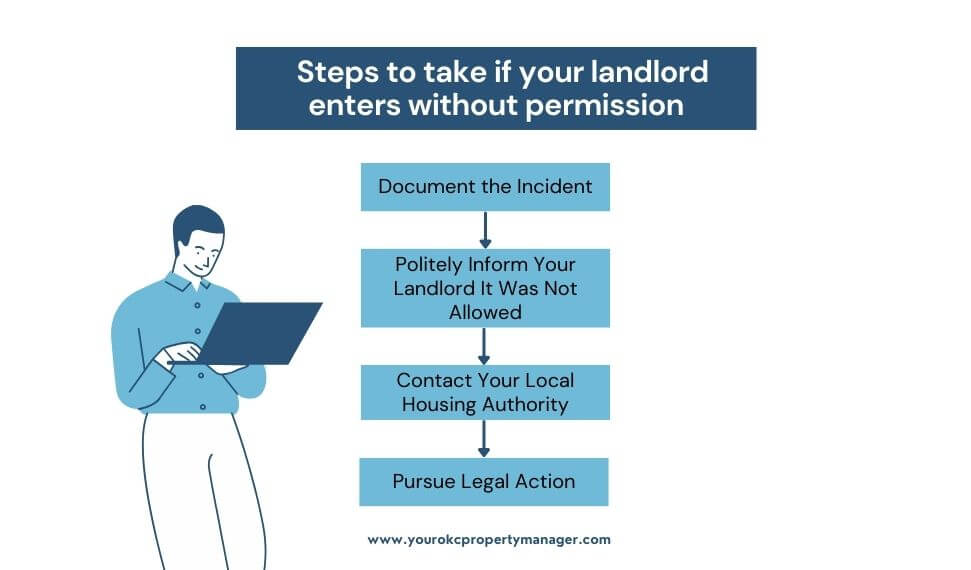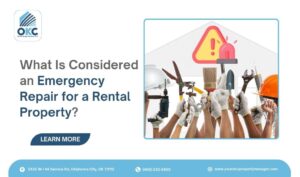Are you tired of feeling like your privacy has been invaded by your landlord entering your rental property without permission? You’re not alone. In the United States, millions of renters face this issue every year. According to a 2025 national survey by LendingTree, 31% of U.S. renters have experienced their landlord entering their home without permission. If you’re one of them, you’re probably wondering what you can do to protect your rights.
In this article, we’ll discuss what you can do if your landlord enters your rental unit without permission, including your legal rights, steps to take, and ways to prevent future unauthorized access. By the end, you’ll be well-equipped to handle this situation and ensure your living environment remains respectful and secure.
Understanding Your Rights as a Tenant
In the United States, tenants have a right to “quiet enjoyment” of their rental property. This means the landlord can only enter the property by giving proper notice and obtaining the tenant’s consent. According to the U.S. Department of Housing and Urban Development (HUD), landlords must provide “reasonable notice” before entering a tenant’s home. Reasonable notice is typically defined as 24 hours or more.
The specific requirements for landlord entry may vary depending on the state and local landlord-tenant laws. For example, some states may require a different notice period or have additional restrictions on when a landlord can enter the property. To understand your rights as a tenant, you must review your lease agreement and consult with a local attorney or tenant advocacy organization.
When Can a Landlord Enter Without Permission?
While landlords have the right to enter your property in certain circumstances, they must provide reasonable notice and have a legitimate reason for doing so. The following scenarios are generally considered acceptable:
- In cases of emergency, such as a fire or flood
- To make necessary repairs or maintenance
- To show the property to potential buyers or renters
- To inspect the property for damage or safety hazards.
What Should I Do if My Landlord Enters Without Permission?
If your landlord has entered your rented property without providing the required notice or without a valid reason, here are some recommended steps to take right away and protect your rights:

Step 1: Document the Incident
Documenting the incident is crucial in case you need to take legal action against your landlord for violating your privacy. Take photos or videos of the property and any changes made during the illegal access. Also, write down details of the unauthorized entry such as the date and time. This documentation will help you build a strong case without any fear.
Step 2: Politely Inform Your Landlord It Was Not Allowed
After that, try to resolve the issue with your landlord directly. This can be done either verbally or by sending a letter or email outlining that unauthorized entry into your home is against the law. Explain that you expect proper notice going forward according to state law. This establishes a record in case of future violations.
Step 3: Contact Your Local Housing Authority
If speaking to the landlord doesn’t resolve the situation or they are unresponsive, file a complaint with your city or county’s housing or code enforcement department. This puts pressure on them to apologize, make amends like assuring no rent increase due to the complaint, and pledge not to repeat the offense. It establishes an official record in case of future problems too.
Step 4: Pursue Legal Action
If your landlord continues to make unwanted entry to your rental unit, you need to consider taking legal action. This could involve filing a lawsuit in small claims court or civil court to seek damages or an injunction to prevent further unauthorized entry. In some states, treble damages of up to three times your actual losses may be awarded.
How to Prevent Future Unauthorized Entry?
At the same time, taking steps to address a current issue of unauthorized entry, there are also measures you can take to help prevent it from happening in the future:

1. Review and Understand Your Lease Agreement
Review your lease agreement carefully to understand the landlord’s rights and obligations regarding entry into the rental unit. If the lease is unclear or lacks specific provisions, you must negotiate for more detailed language during the next renewal.
2. Establish Clear Communication with Your Landlord
Maintain open, respectful communication with your landlord to avoid misunderstandings and build a stronger, more cooperative landlord-tenant relationship. Proactively discuss the issue of unauthorized entry and establish clear expectations and boundaries. Suggest a mutually agreeable process for scheduling necessary maintenance or repairs.
3. Install Security Measures On the Unit
Installing security measures, such as deadbolts, smart locks, or security cameras, helps deter unauthorized entry and provide evidence if an issue arises. Make sure to check with your landlord first, as some rental agreements may have restrictions on the types of security devices you can install.
4. Document and Report All Incidents
Keep consistently documenting and reporting any incidents of unauthorized entry, even if they seem minor. This creates a paper trail that can be used as evidence if the issue becomes worse.
5. Seek Legal Assistance if Necessary
If your landlord continues to violate your privacy rights, don’t hesitate to seek legal assistance. A landlord-tenant attorney can advise you on your rights and help you navigate the appropriate legal channels to address the problem.
Conclusion on Landlord Entering Without Permission
Your right to privacy and the peaceful enjoyment of your rented home is a fundamental right that is protected by federal and state laws in the United States. If your landlord has been entering your home without permission, you have legal recourse and options available to address the issue.
By understanding your rights, documenting the unauthorized entry, communicating with your landlord, and, if necessary, taking legal action, you can ensure that your privacy is respected and that your landlord complies with the law. Remember, standing up for your rights as a tenant is crucial to maintaining a safe and secure living environment. If your landlord tries to retaliate by issuing an eviction notice after you report unauthorized entry, consult a legal professional immediately, this could be considered unlawful eviction depending on state laws.
If you have any further questions or concerns about your landlord’s entry into your rented property, don’t hesitate to consult with a local landlord-tenant attorney or property management company in Oklahoma City, like OKC Home Realty Services, who can provide personalized guidance and assistance.
FAQs About Landlord Entry Without Permission
What constitutes a violation of my privacy rights as a tenant?
A landlord entering your rental unit without your consent, except in emergencies or as allowed by law, is a violation of your privacy rights. This includes entering without proper notice, doing so for reasons not outlined in the lease or local regulations, or using the entry as a form of intimidation. To better understand how this behavior can cross legal lines, check out this guide on what landlord harassment looks like.
Can I change the locks to prevent my landlord from entering?
In most cases, you cannot change the locks without your landlord’s permission, as the rental property still belongs to the landlord. However, if your landlord has a history of unauthorized entry, you may be able to take legal action to compel them to provide you with a new set of keys or change the locks themselves. For more information, go through article, can a Tenant Change the Lock.
Can I withhold rent if my landlord keeps entering without permission?
Withholding rent is generally not recommended as a response to a landlord’s unauthorized entry, as it may be considered a breach of the lease agreement. Instead, focus on documenting the incidents, communicating with your landlord, and pursuing legal remedies if necessary. Withholding rent should be a last resort only after consulting with a local landlord-tenant attorney.
Can I sue my landlord for entering without notice?
Yes, you can sue your landlord if they enter your rental unit without proper notice, as most laws require advance notice except in emergencies. Check your local laws and lease terms, document the incidents, and consider legal advice to protect your rights.

Author
Scott Nachatilo is an investor, property manager and owner of OKC Home Realty Services – one of the best property management companies in Oklahoma City. His mission is to help landlords and real estate investors to manage their property in Oklahoma.
 (
(









